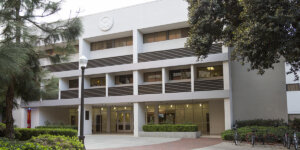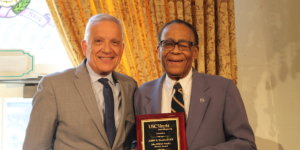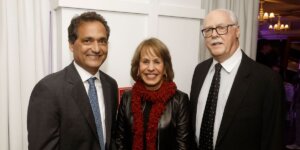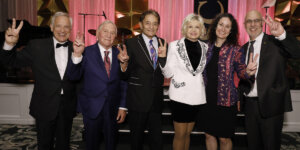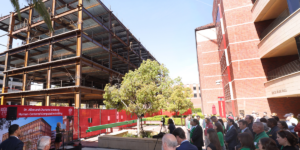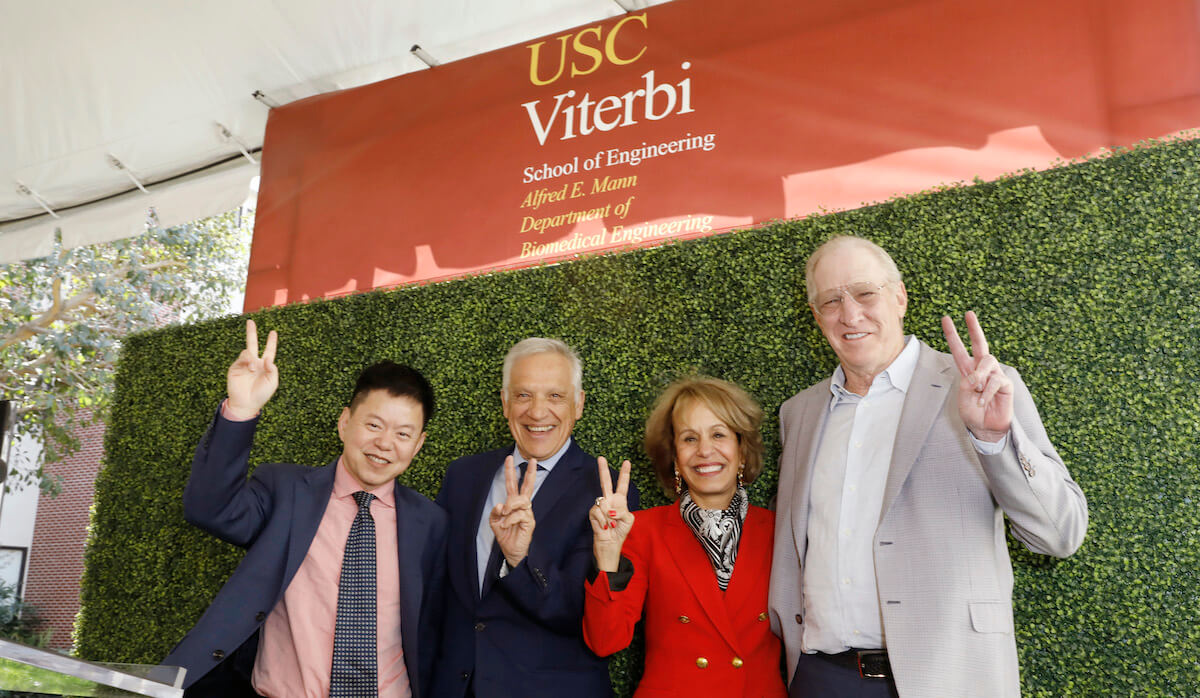
Alfred E. Mann Department of Biomedical Engineering Chair Peter Yingxiao Wang, USC Viterbi Dean Yannis C. Yortsos, USC President Carol L. Folt and Michael Dreyer, trustee of the Alfred E. Mann Charities. Image/Steve Cohn
For almost 50 years, biomedical engineering researchers at the University of Southern California have been at the forefront of discoveries spanning bionic vision, biomedical devices to restore memory, groundbreaking new medicines, and more.
This month, following one of the nation’s largest-ever gifts to a biomedical engineering department, the newly named Alfred E. Mann Department of Biomedical Engineering reflected on its illustrious past and celebrated a dynamic future.
Attendees gathered in the Epstein Family Plaza at USC Viterbi School of Engineering on April 5, 2023, to commemorate the historic $35 million naming gift from the Alfred E. Mann Charities and Alfred E. Mann Foundation for Biomedical Engineering. This generous gift will enable the recruitment of the top research and teaching minds in the field. The gift will also support more robust research and teaching collaborations with the Keck School of Medicine of USC.
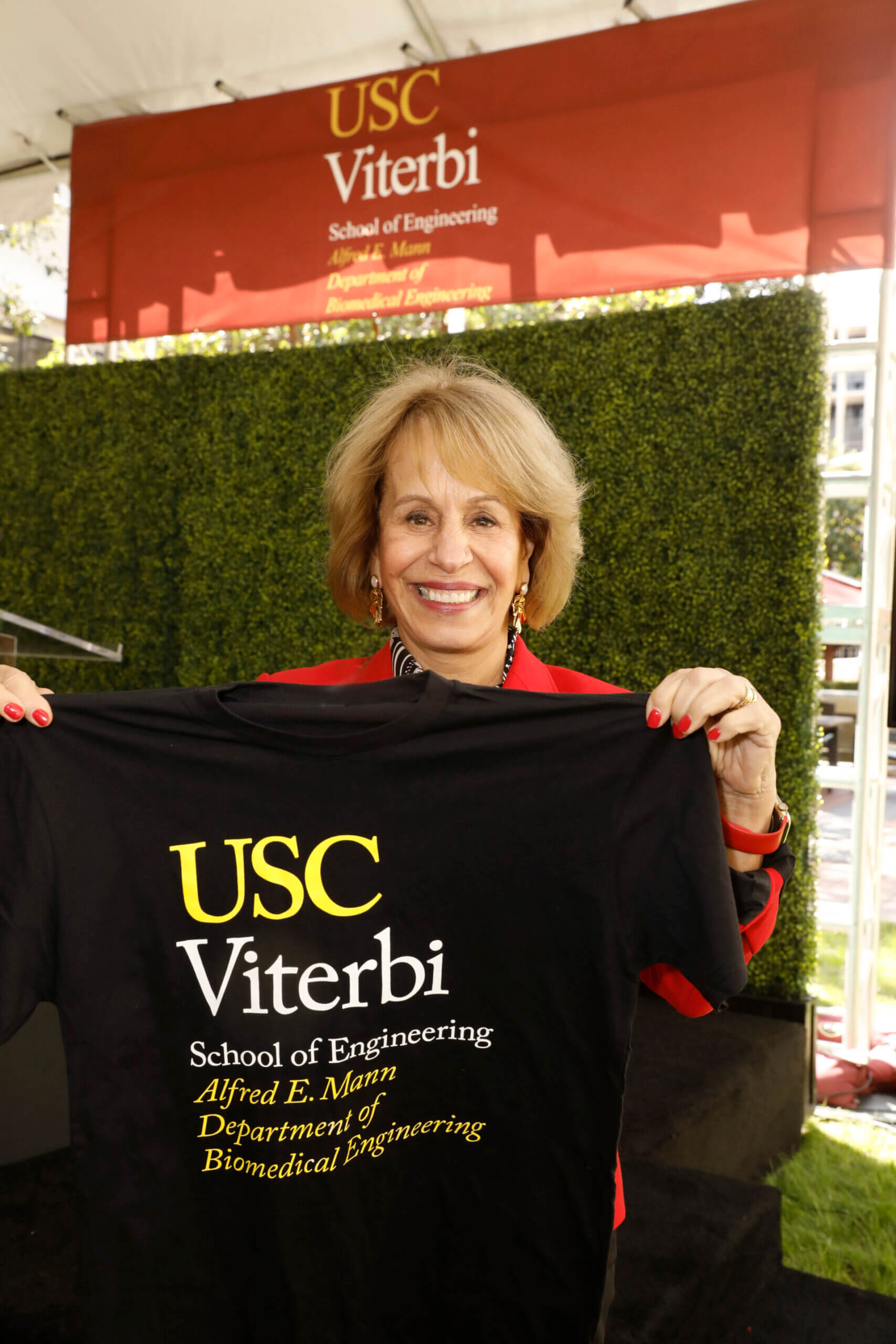
USC President Carol L. Folt. Image/Steve Cohn.
Guests at the naming celebration enjoyed a rousing performance from the Trojan Marching Band as USC President Carol L. Folt and USC Viterbi Dean Yannis C. Yortsos officially unveiled the Alfred E. Mann Department’s name.
“We’re here because of Alfred E. Mann’s foresight and generosity,” Folt said. “He was an incredible problem solver, he was an innovator, and most of all, he was a humanitarian. What made him truly special was that he kept people very much at the heart of every single one of his discoveries.”
“He wasn’t an engineer—he was a physicist by training, but engineering could have found no better friend than Alfred E. Mann,” Folt said.
Folt said the legacy gifts from the Alfred E. Mann Charities would provide limitless opportunities for biomedical engineering at USC, infusing new life into the department’s work and expanding its impact.
Addressing faculty, staff and students, Folt said: “I’ve been told this by people who knew him well; Al Mann would be so excited and would so much love to know all the good work you’ve been doing and the work ahead.”
Yortsos said naming academic departments was an important goal for USC Viterbi, with naming gifts providing additional resources for advancing the school’s mission in education, research, and impact. He said the naming of the Alfred E. Mann department was a testament to the importance of the biomedical engineering field and its vast impact.
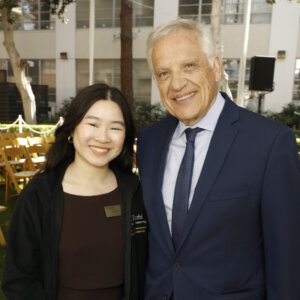
USC Viterbi senior Sabrina Sy and USC Viterbi Dean Yannis C. Yortsos. Image/Steve Cohn
“With it comes the ability to reimagine medical engineering, whether in education, research, or practice, and to advance the convergence of engineering with medicine and health across the university,” Yortsos said.
Yortsos welcomed the new Department Chair, Peter Yingxiao Wang, a leading expert in precision medicine for cancer therapies, who would take the lead in integrating engineering and medicine at USC to promote the translation of cutting-edge engineering technologies into medical applications.
“We envision a truly new, inspiring, agile, convergent, and impactful partnership with our Keck and other Health Sciences colleagues to truly integrate engineering and medicine in all their facets,” Yortsos said. “We are here to shape the future at this accelerating convergence. A future that has never been brighter, with today’s celebration of the Alfred E. Mann Department of Biomedical Engineering.”
Also speaking at the celebration was biomedical engineering senior Sabrina Sy, President of the Associated Students of Biomedical Engineering. Sy said she was proud to be the product of a department that actively encouraged students to work at the interface between engineering and medicine to solve the world’s most pressing healthcare issues.
“Through the generous gift from the Alfred E. Mann Foundation for Biomedical Engineering, I know that the department’s mission to improve human health and well-being will live on, not just within those who are here with us today, but in the future generations of USC BME faculty and students,” Sy said.
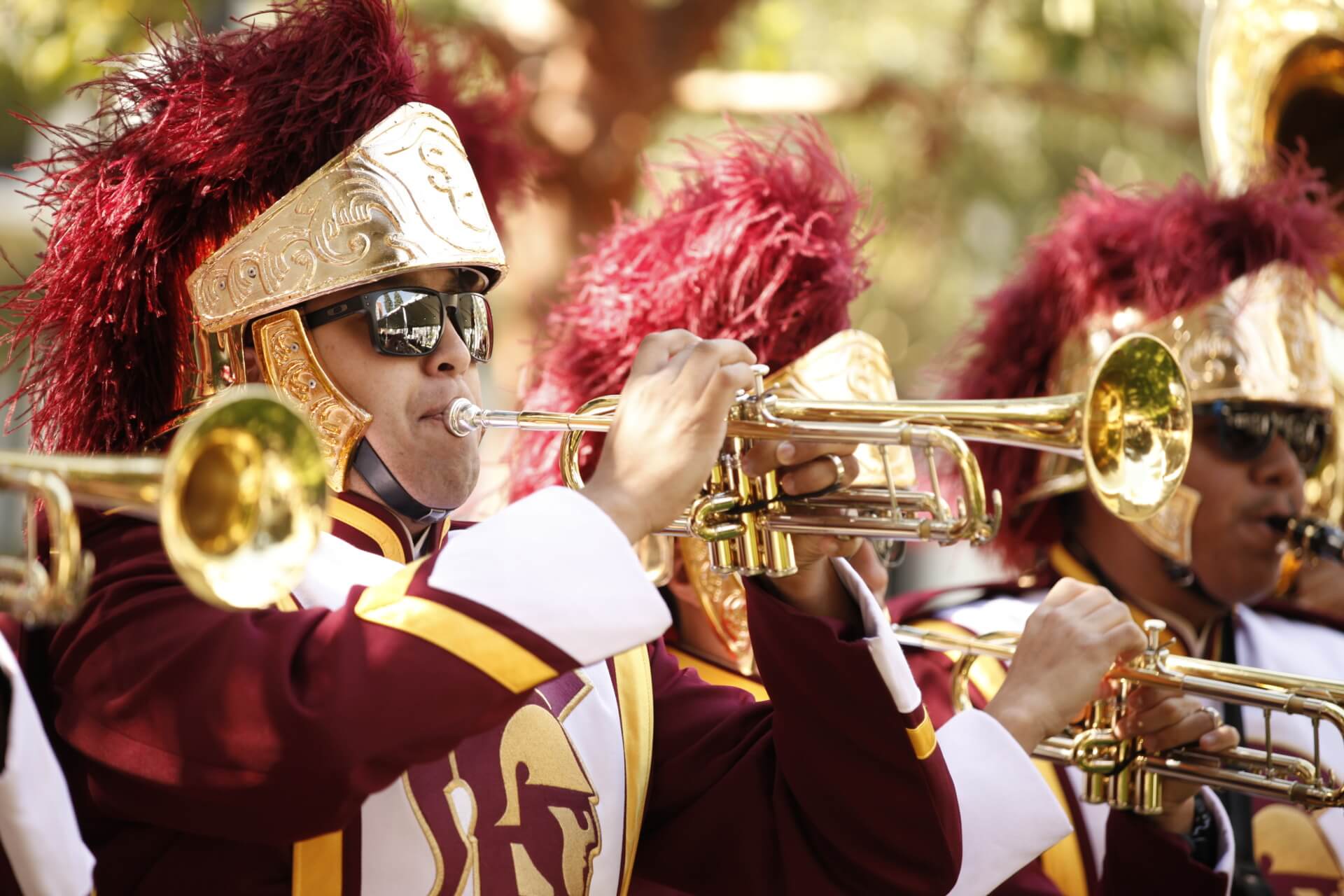
The USC Trojan Marching Band performs at the naming of the Alfred E. Mann Department of Biomedical Engineering. Image/Steve Cohn
A strong track record of biomedical breakthroughs
The biomedical engineering program at USC was first born in 1967 when USC Engineering Dean Zohrab Kaprielian recruited Dr. Fred Grodins from Northwestern University to lead the discipline area. The first BME Ph.D. program at USC was then launched in 1969, and in 1976 Grodins became the founding chair of the newly formed BME department. It was the first BME program in California to offer bachelor, master and Ph.D. degrees.
Since its foundation, USC Viterbi’s BME department has been a trailblazer across a range of significant biomedical discoveries, including:
- Bionic vision: In 2013, the Argus 2 device was developed by Cornelius J. Pings Chair in Biomedical Sciences and University Professor of Ophthalmology, Biomedical Engineering and Cell and Neurobiology Mark Humayun. It became the first FDA-approved artificial retina in the United States to restore sight to people who are blind.
- Restoring memory: In 2011, the world’s first brain implant to restore lost memory function and strengthen recall was developed by David Packard Chair in Engineering and Professor of Biomedical Engineering Professor Ted Berger.
- New medicines: USC Viterbi’s longest continuously funded NIH research center, the USC Biomedical Simulations Resource (BMSR), developed the ADAPT software platform, which led to the discovery of the first biologic for the treatment of breast cancer, Herceptin, as well as Rituxan for treating non-Hodgkin’s lymphoma.
Most recently, the department announced a new $11.7 million research center for modular open-source implantable devices for the nervous system. Technology created by the center will monitor and stimulate the autonomic nerves to treat various chronic diseases.
A gift to forge continued excellence and future collaboration
Alfred E. Mann was a leading physicist, philanthropist, and biotech entrepreneur who developed and supported biomedical breakthroughs such as the rechargeable pacemaker, insulin pumps, and the artificial retina. A former USC trustee, in 1998, Mann founded the Alfred E. Mann Institute at USC. Mann passed away in 2016, with the Alfred E. Mann Charities continuing his legacy of supporting the development of critical medical technology to aid humanity.
The Alfred E. Mann Charities’ latest investment in the future of biomedical engineering at USC marks the fifth department naming gift at USC Viterbi. The recently named USC Alfred E. Mann School of Pharmacy and Pharmaceutical Sciences was also a beneficiary of a $50 million endowment thanks to the Alfred E. Mann Charities.
The Mann gift to BME will expand medical engineering research, attract top faculty members and strengthen the department’s research and teaching collaborations with both the Keck School and USC Mann. Another $25 million will go towards interdisciplinary endowed chairs across multiple schools to support life-improving and life-saving research, innovation, and student learning.
Published on April 6th, 2023
Last updated on April 10th, 2023




